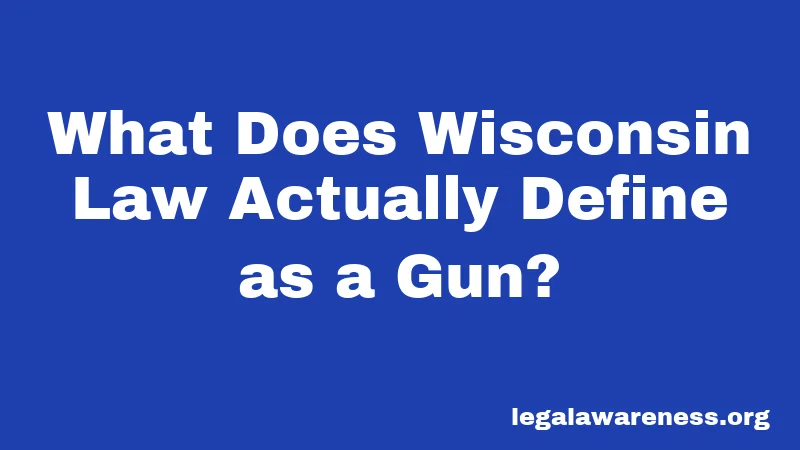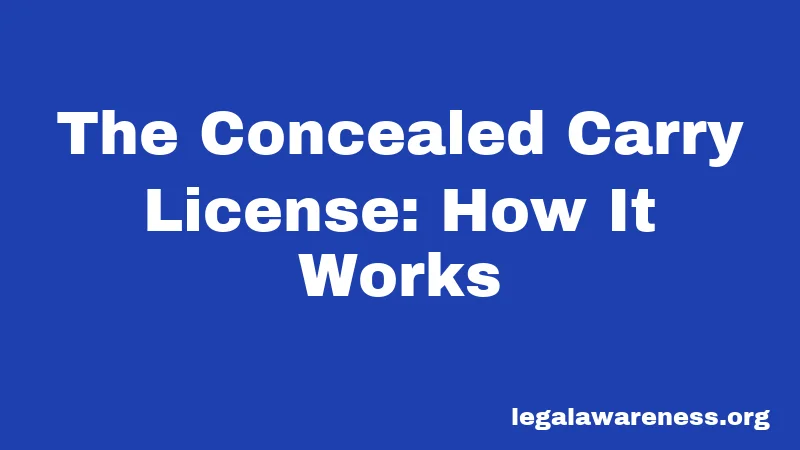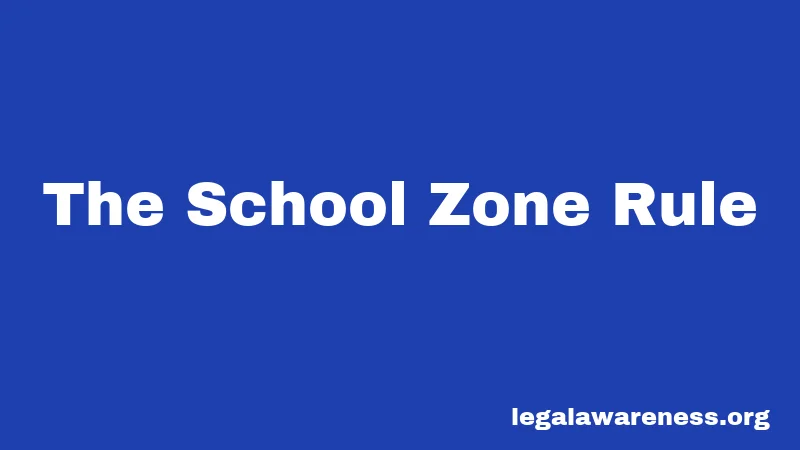Wisconsin Gun Laws in 2026: What Wisconsinites Actually Need to Know
Most people in Wisconsin have no idea how strict some gun laws are. Seriously. You could think you’re following the rules and accidentally break one. Penalties? They’re serious. We’re talking jail time and massive fines.
Here’s the good news: understanding Wisconsin gun laws is way simpler than you think. This guide breaks down exactly what you need to know. No confusing legal stuff, just the real rules that apply to you.
What Does Wisconsin Law Actually Define as a Gun?

Wisconsin law is pretty specific about what counts as a firearm. Any weapon that uses gunpowder to fire a projectile is a gun. That includes handguns, rifles, shotguns—basically anything that shoots bullets.
But here’s where it gets interesting. Wisconsin law also regulates weapons that aren’t traditional firearms. Electric weapons like Tasers? Those count too. Billy clubs and certain knives are also regulated weapons. Right? So when you hear “weapon,” don’t just think guns.
The law covers short-barreled rifles and shotguns separately. These have special rules. A short-barreled rifle has a barrel under 16 inches. A short-barreled shotgun has a barrel under 18 inches. These weapons are heavily regulated, and carrying them is serious business.
Open Carry vs. Concealed Carry: The Big Difference
Here’s something that surprises a lot of people. Wisconsin allows open carry. You can carry a gun openly without a license. The law actually protects this right. You can walk around with a visible gun on your hip if you want to.
But—and this is important—open carry comes with rules. You must be 18 or older. You can’t have been convicted of a felony. You can’t carry into certain places. And here’s the catch: if the property owner asks you to leave, you must leave immediately. Staying could mean trespassing charges.
Concealed carry is totally different. You absolutely need a license for this. And that license requirement is no joke. Carrying concealed without a license is a Class A misdemeanor.
The Concealed Carry License: How It Works

To carry a concealed weapon in Wisconsin, you need a Concealed Weapons License (CWL). No exceptions. Over 460,000 Wisconsin residents have one right now.
Here’s what you need to qualify:
You must be 21 or older. You need to complete a firearms training course. You can’t have a felony on your record. You can’t be subject to a restraining order. You can’t be found to be a danger to yourself or others.
Wait, it gets better. You need to have a valid license with you at all times when you’re carrying. Your license AND a photo ID. If a police officer asks, you must show both. Not showing them? That’s another crime.
The Wisconsin Department of Justice issues these licenses. You apply through them, and they’ll let you know if you qualify. The process takes time, so don’t expect instant approval.
Not sure what counts as a valid training course? Handgunlaw.us has a list, or you can contact the Wisconsin DOJ directly at (608) 261-7998.
Where You Can and Cannot Carry (This Is Important)
Okay, pause. This part gets tricky, so read carefully. Even if you have a license, there are places you absolutely cannot carry.
You cannot carry concealed in:
Police stations, sheriff’s offices, or state patrol stations. Courts and courthouse buildings. Prisons, jails, or any correctional facility. Public schools (including the grounds). Secure mental health facilities. Federal buildings. Hospitals (check local policies). Bars where alcohol is served and consumed.
Here’s where it gets sneaky. If a property owner posts a sign saying “No Guns,” you can’t carry there. The sign needs to be at least 5 inches by 7 inches and clearly visible. If you enter anyway, you’re trespassing AND violating carry laws.
Private business owners have the right to ban guns. Restaurants that serve alcohol but don’t have a bar area? You can carry there and eat. But sit at the bar or drink alcohol while carrying? Now you’re breaking the law.
Confused about a specific location? Ask the property manager. It’s better to ask than to guess wrong.
The School Zone Rule

Schools are a big no-go. You cannot carry any firearm in a school building, on school grounds, or within 1,000 feet of school property while carrying a concealed weapon without a license. Even if you have a license, it doesn’t protect you from this federal restriction in most cases.
Think of it this way: federal law says school zones are gun-free for everyone except law enforcement. Wisconsin follows that rule. The only exception? If the firearm is unloaded, cased, and locked in your vehicle, you can technically drive onto school property. But it’s risky, so double-check local policies.
How to Transport Guns in Your Car
Honestly, this is the part most people get wrong. Wisconsin has specific rules about carrying guns in vehicles, and they’re not what you’d think.
For loaded handguns: You can carry a loaded handgun in a vehicle, but it cannot be concealed and within reach unless you have a license. So basically, it needs to be visible. Or in your glove box with a license.
Here’s the Wisconsin Supreme Court ruling that changed everything: a gun in a glove box is considered “concealed within reach.” This means you need a license to legally keep a loaded handgun there. Without a license, a loaded handgun cannot be hidden from view inside your vehicle.
For long guns (rifles and shotguns): These must be unloaded while the vehicle is running. They don’t need to be encased anymore, but they need to be in plain sight. Not visible? That’s a violation.
So real talk: if you’re transporting firearms in Wisconsin, keep them unloaded and visible, or have a valid concealed carry license. Don’t take chances here. Transportation violations are Class A misdemeanors.
Carrying While Under the Influence (Don’t Do This)
This one should be obvious, but it’s worth stating clearly. You cannot carry a firearm while under the influence of alcohol or drugs. This applies whether you’re carrying openly or concealed.
Wisconsin law calls this “carrying while impaired.” It doesn’t matter if you can still walk straight. If your judgment is affected at all, it’s illegal.
The penalty? Class A misdemeanor. Up to nine months in jail and a fine up to $10,000. And that conviction can cause you to lose your firearm rights forever.
Personally, I think this law makes sense. Guns and altered judgment don’t mix. Period.
Penalties: What Happens When You Break the Law
Let’s talk consequences, because Wisconsin doesn’t mess around.
Unlawful concealed carry (no license): Class A misdemeanor. Up to nine months in jail. Fine up to $10,000. Or both.
Carrying in a prohibited location: Class A misdemeanor. Same penalties: up to nine months, up to $10,000 fine.
Carrying while impaired: Class A misdemeanor. Up to nine months, up to $10,000.
Carrying a short-barreled rifle or shotgun: Class H felony. This one’s more serious. You could face extended prison time.
Possession of a silencer: Class F felony. Even more serious.
A conviction stays on your record for life. Future employers will see it. Landlords will see it. You lose your right to own firearms in the future. These consequences are real and permanent.
In 2023, Wisconsin revoked 1,215 concealed carry licenses. People made mistakes. Don’t be one of them.
Special Circumstances: Rules You Might Not Know
Self-defense laws in Wisconsin are interesting. The state has a “Castle Doctrine” and “Stand Your Ground” law. This means you have the right to defend yourself, your home, and your business without a duty to retreat.
If someone is attacking you, you can use force to stop them. You don’t have to run away first. Your home, vehicle, and business are your “castle,” and you have extra protections there.
But here’s the catch: you can only use deadly force if you reasonably believe it’s necessary to prevent death or serious injury. You can’t use force just to protect property. And you have to reasonably believe the threat is real.
Minors and firearms: Children under 18 generally cannot possess firearms except in specific situations. Supervised hunting, target practice under adult supervision, and certain educational situations are allowed. But a kid can’t just carry a gun around. Full stop.
Kids under 10 can hunt mentored hunts with an adult. Kids 14-15 have more options for hunting with proper supervision. These rules are strict, so check with the Wisconsin Department of Natural Resources if you have questions.
Recent Changes to Know About (2024-2025)
Wisconsin has been active with gun law updates. Watch out for changes to waterway regulations. The Wisconsin DNR recently changed rules about carrying firearms on certain waterways. Check current regulations before heading out.
The legislature continues to debate gun laws. Some proposals would strengthen protections for gun owners. Others would add restrictions. As of 2025, no major changes have passed recently, but stay informed.
The best way to stay updated? Check the Wisconsin Department of Justice website or the Department of Natural Resources site regularly. Laws change, and you need to know the current rules.
How to Get a Wisconsin Concealed Weapons License
Want to carry concealed legally? Here’s how to do it.
Step 1: Complete an approved firearms training course. You need proof of completion. Different courses are approved, including law enforcement training, military training, or certified private instruction.
Step 2: Apply through the Wisconsin Department of Justice. You’ll fill out an application asking about your background. Be honest. Lying on the application can get you charged with a felony.
Step 3: Wait for background check processing. The DOJ will check your criminal history, medical records, and other factors.
Step 4: Receive your license by mail. It’s valid for five years. You need to renew before it expires.
Step 5: Always carry your license AND a photo ID when you carry a concealed weapon.
The process usually takes 21 days, but can take longer. Apply online at concealedcarry.doj.wi.gov. If you have questions, call (608) 261-7998.
Trust me, getting the license is worth it if you want to carry legally.
Frequently Asked Questions
Can I carry a gun on Wisconsin state park land?
Partially. With a concealed carry license, you can carry a handgun openly or concealed in state parks. Without a license, you can only carry openly. Long guns are restricted, and you cannot carry any firearm in tax-payer-owned buildings in parks. Always check specific park rules.
What happens if I accidentally leave my gun in a restaurant?
The restaurant will typically call law enforcement. They’ll hold it and contact you. You’re responsible for picking it up through proper legal channels. This isn’t necessarily illegal, but it’s embarrassing and inconvenient. Don’t let it happen.
Can I carry my gun into a store that has alcohol?
It depends. If it’s a restaurant with a bar area where alcohol is consumed, you cannot carry. If it’s a restaurant that serves alcohol but you’re not in the bar area, you can carry. Don’t consume alcohol while carrying. If it’s a liquor store (alcohol for off-premises consumption), you can carry. Always ask the manager if you’re unsure.
Does Wisconsin honor concealed carry licenses from other states?
Yes, but only from certain states. Wisconsin has reciprocity agreements with many states. If you’re traveling with an out-of-state license, verify that Wisconsin honors it. Wisconsin law enforcement won’t accept a license from a non-reciprocal state. Check the Wisconsin DOJ website for the current reciprocity list.
What’s the difference between “concealed” and “openly carrying”?
Open carry means your gun is visible to people around you. Concealed means it’s hidden from ordinary observation. Wisconsin courts have ruled that even a gun in a purse counts as concealed if it’s accessible. And here’s the tricky part: a gun in plain sight in a car might still be considered concealed if it’s not visible from outside the vehicle. When in doubt, get a license.
Final Thoughts
Wisconsin gun laws are complicated, honestly. But they’re not impossible to understand. The key rule? If you want to carry concealed, get a license. If you want to carry openly, make sure you’re not in a prohibited place. And never, ever carry while impaired.
Over 460,000 Wisconsinites legally carry concealed weapons. They made it easy on themselves by getting licensed. They stayed informed. They followed the rules.
You can too. Stay educated, stay safe, and when in doubt, look up the law or ask a lawyer. That’s not paranoia—that’s smart.
References
Wisconsin Department of Justice – Concealed Carry Information
Wisconsin Concealed Carry License Application
Wisconsin Statutes Chapter 941 – Firearms and Weapons
Wisconsin Department of Natural Resources – Firearm Regulations
Handgunlaw.us – Wisconsin Gun Laws
Wisconsin State Law Library – Firearms and Weapons
Giffords Law Center – Wisconsin Gun Laws
Wisconsin Legislative Council – Firearm Regulation Information Memorandum
